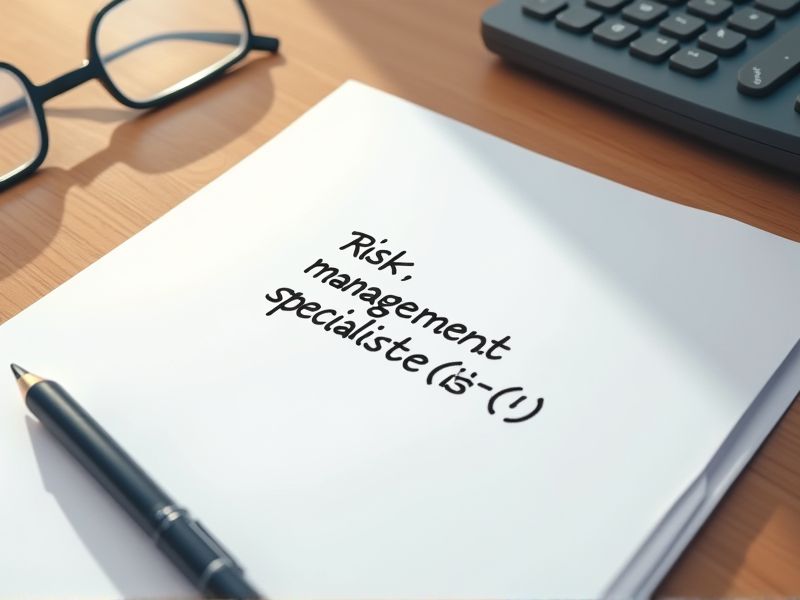
Financial risk management specialists require specific certifications to demonstrate their expertise in managing financial uncertainties and ensuring an organization's economic stability. Certifications validate a professional's ability to assess risk accurately and implement effective mitigation strategies against potential financial losses. These credentials also offer the industry-recognized standards that employers seek when hiring competent and reliable risk management professionals. Below are some key certifications crucial for a Financial Risk Management Specialist.
FRM (Financial Risk Manager)
FRMs are essential for identifying and mitigating financial risks, which reduces potential losses and stabilizes performance. Expertise in market, credit, and operational risks allows FRMs to implement effective strategies, enhancing a firm's decision-making process. Their analytical skills enable accurate risk assessments, promoting investor confidence and ensuring regulatory compliance. Data-driven insights they provide help in optimizing financial resources and achieving sustainable growth.
CFA (Chartered Financial Analyst)
CFA enhances understanding of complex financial instruments, which aids financial risk management specialists in assessing potential market risks. The program provides advanced knowledge in quantitative analysis, crucial for identifying and evaluating financial risks accurately. CFA charterholders are equipped with ethical guidelines, reinforcing integrity in risk management practices. Global recognition of the CFA credential boosts credibility, which is vital for gaining stakeholders' trust in risk assessments.
PRM (Professional Risk Manager)
The increasing complexity of financial markets often leads to a higher potential for unforeseen risks, making the expertise of a Professional Risk Manager crucial for accurate risk assessment. Specialized training acquired through the PRM designation equips financial risk management specialists with advanced analytical tools to anticipate and mitigate potential market disruptions. Regulatory environments demand rigorous compliance measures, and PRM holders possess the knowledge required to align risk practices with these evolving standards. The proliferation of financial products necessitates sophisticated risk models, which PRM-certified professionals can adeptly construct and implement.
CAIA (Chartered Alternative Investment Analyst)
Possessing the CAIA designation equips a financial risk management specialist with a deeper understanding of alternative investments, which are crucial in diversifying risk. Alternative investments, like hedge funds and private equity, often have different risk dynamics compared to traditional securities, enhancing a specialist's risk assessment capabilities. Employers value the CAIA designation as it signifies advanced expertise and commitment to the field of alternative investments, which is essential in managing complex financial portfolios. Professionals with CAIA certifications can provide more comprehensive risk management strategies, optimizing returns while mitigating unforeseen risks.
CQF (Certificate in Quantitative Finance)
Financial risk management specialists require advanced quantitative skills, which the CQF provides, enhancing their ability to model and assess complex financial instruments. The program equips professionals with in-depth knowledge of mathematical and computational methods crucial for effective risk analysis. As financial markets grow increasingly volatile, the CQF ensures specialists are adept at predictive modeling to mitigate risks accurately. The certification also signals a higher level of expertise to employers, offering career advancement opportunities in competitive finance sectors.
CRM (Certified Risk Manager)
The role of a Certified Risk Manager (CRM) enhances a financial risk management specialist's ability to identify and assess potential financial pitfalls accurately due to their comprehensive training. This credential instills robust methodologies in managing uncertainties and aids in devising effective strategies to mitigate risks. Employers favor professionals with CRM certification as it reflects a commitment to ethical practices and continuous learning in dynamic financial landscapes. CRM-holders often spearhead risk management initiatives, driving stability and fostering growth within organizations.
CRISC (Certified in Risk and Information Systems Control)
The CRISC certification equips financial risk management specialists with a comprehensive understanding of risk management frameworks, directly improving their ability to predict and mitigate potential financial threats. With its focus on governance and risk control, CRISC enhances a specialist's capability to align IT risk strategies with overall organizational goals, ensuring better decision-making. In organizations where safeguarding sensitive information is crucial, CRISC-certified professionals ensure that robust information systems controls are in place. Their expertise in risk assessment and mitigation provides a strategic advantage, strengthening the organization's capacity to handle financial uncertainties effectively.
CTP (Certified Treasury Professional)
The CTP designation equips financial risk management specialists with advanced knowledge in cash and liquidity management, critical for making informed decisions under volatile economic conditions. Enhanced understanding of financial regulations and compliance frameworks provided by CTP helps in identifying and mitigating potential risks proactively. CTP training improves strategic forecasting skills, ensuring the organization can better anticipate and plan for various financial contingencies. Possessing a CTP certification can increase credibility with stakeholders and clients, leading to more effective collaborations and strategic partnerships.
CMT (Chartered Market Technician)
CMT certification equips financial risk management specialists with advanced technical analysis skills, enhancing their ability to predict market movements. Enhanced predictive capabilities from technical analysis can lead to more informed risk management decisions. Specialization in technical analysis reduces the dependency on singular financial models and methods, diversifying risk assessment approaches. A comprehensive understanding of market trends and behaviors can result in more successful risk mitigation strategies.
RIMS-CRMP (RIMS Certified Risk Management Professional)
RIMS-CRMP certification standardizes and validates a professional's expertise in risk management methodologies, crucial for ensuring effective financial risk mitigation. Financial risk management specialists with RIMS-CRMP credentials have a competitive advantage, as their knowledge is backed by a globally recognized certification. This certification equips specialists with a structured approach to identifying, analyzing, and managing risks, enhancing their ability to safeguard assets and investments. Employers often value RIMS-CRMP-certified professionals for their proven commitment to maintaining high standards in risk management practices.
Summary
With certifications, you enhance credibility and attract more career opportunities. Employers often favor certified specialists, leading to higher job security and potential salary increases. Your expertise in risk assessment improves, reducing financial losses for your company. Networks expand as you connect with other certified professionals, fostering collaboration and knowledge sharing.
